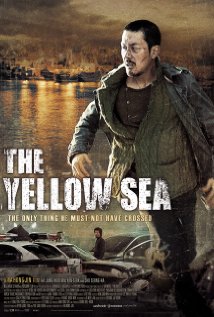
(A.k.a. HWANGHAE)
THE YELLOW SEA begins by examining the character of "The Cab Driver". His name is Gu-nam (Jung-woo Ha) and as his story opens he’s living a life of near-squalor in Yanji, in China. After witnessing him losing a not-so-friendly game of mah-jong with mates, we catch up with him in his fleapit apartment – where he’s visited by particularly nasty debt collectors early one morning.
We subsequently follow Gu-nam through the slums of Yanji city as he struggles to earn enough of a living to survive as a taxi driver, and make instalments against his debt in the meantime. All the while, he’s conscious that his wife Lee Hwa-Ja has not contacted him since leaving for Korea some six months earlier, in pursuit of employment. When asking an old friend of hers whether she’s heard from Lee, Gu-nam is incensed at the suggestion that many job-seeking women who cross the yellow sea – a naturally beautiful expanse of water that sits between China and Korea – end up becoming whores.
Gu-nam’s stress levels rise significantly when he continues to lose at games of mah-jong in seedy environments and, worse still, winds up losing his taxi-driving job.
Just when all seems lost, Gu-nam’s debt collector turns up at his apartment and tells him there’s some good news coming his way. He marches Gu-nam to a nearby street market where he’s introduced to shady character Myun (Yun-seok Kim). Myun takes Gu-nam for lunch, and in the process makes him an offer: go to Korea and kill someone for him. He suggests that by doing so, his debt will be wiped out – and he can finally catch up with his wife while he’s over there.
Gu-nam visits his young daughter, living with her grandmother, while deliberating about whether to take the job. Of course, in the long run we know what his answer is going to be, and we meet another supposed facet of his character – "The Killer" – as he lands in Seoul to carry out the dreaded deed.
The real surprise is the sequence of events that unfold once Gu-nam arrives in Korea with nervous thoughts of murder in mind. Giving much more away seems sinful. Suffice it to say, there’s a whole heap of tension in store as Gu-nam negotiates alien territory – being just as obsessed with finding his wife (is she cheating on him, as everyone back in China kept suggesting?) as he is with doing the business for Myun. From here, THE YELLOW SEA develops in catastrophically unexpected, violent and at times revelatory ways.
The film opens with a monologue from Gu-nam, reminiscing over a pet dog he had as a kid. He tells of how it contracted rabies. As the film progresses, you realise the significance of this story and how it says as much about the undignified downward spiral that Gu-nam finds himself sucked into, as the mutt he’s referring to.
This opening speech also serves as a chilling social commentary, observing the metaphorical diseases that run through modern-day Korea – addictions, familial distance, poverty, isolation, alienation, urban violence ...
There are certainly a great deal of all the above on offer throughout Hong-jin Na’s stylish, controlled film. Considering his last movie, THE CHASER, was such a huge box office hit on home shores, THE YELLOW SEA is commendably at one with the lower rungs of society – and has a lot of embittered statements to make about the underbellies of both Korean and Chinese culture in today’s climate.
In short, THE YELLOW SEA sees Na (he writes and directs) deliver another masterpiece. Upon first viewing, it perhaps doesn’t seem as gritty as THE CHASER due to moments of wry humour peppered throughout – the pay-off to the elongated build-up to Gu-nam’s ‘hit’ is priceless, for example. But once it sinks its teeth in and events turn increasingly sour for Gu-nam, this becomes as gripping a thriller as you could hope for.
Performances are as uniformly excellent as the film’s technical aspects – from the camerawork, to the slick editing and invigorating score, this is a typically Korean film in terms of its very concentrated skill. In the past, this brand of efficiency has rendered some of the country’s otherwise great films as a little too cold to fully engage with. But, as with recent efforts such as BEDEVILLED, THE YELLOW SEA successfully strikes the balance between technical brilliance and thoroughly engaging drama.
Did I mention that it also gets awfully violent, following its carefully considered build-up ...?
The film is due to enjoy a limited theatrical run in the UK during October, and is then pencilled in for a release on DVD and blu-ray on 20 February 2012. If you get the chance to see it on the big screen, I urge you to do so: the cinemascope compositions are a marvel, even when employing handheld camera for more intimate scenarios.
But THE YELLOW SEA is going to be just as impressive on domestic release, and I for one can’t wait for Eureka’s subsidiary label Bounty Films to get this out on digital format in the New Year.
Highly recommended.
Review by Stuart Willis
| Released by Bounty Films |
| Rated 18 |